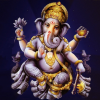 Submitted by Dr. Chaturvedi on
Submitted by Dr. Chaturvedi on

pixabay.com
As the story goes, a Western philosopher was once asked, "What is mind?" He replied, "No matter." He was asked again, What is matter?" And he replied "Never mind". The implication of what the philosopher said was that mind is not matter. Hindu philosophy emphatically declares that mind is matter -- although extremely subtle matter. Hindu psychology does not see any difference between matter and energy. Hindus recognize psychic energy, which they considered to be the manifestation of the cosmic energy called Prana, long before Professor Jung felt the need for a concept of psychic energy. The oldest school of religious philosophy, the Sankya school, which is several thousand years old -- saw no difference between matter and energy.
In addition, the Yoga school of Panatanjali talks about the astounding powers that the mind can acquire when it is fully controlled and concentrated.
Hindu psychology recognized three states of mind --
the unconscious or the subconscious,
the conscious, and
the superconscious.
When the mind is in the superconscious state it is said to be in Samadhi. In this state the mind becomes thoroughly illumined by experiencing Divinity and transcends the limitations of the nervous system. Swami Vivekenanda (1863-1902) in his book Raja Yoga has explained this superconscious state of mind as follows:
There is a still higher plane upon which the mind can work, It can go beyond consciousness, Just as unconscious work is beneath consciousness, so there is another work which is above consciousness, and which is not accompanied with the feeling of egoism. The feeling of egoism is only on the middle plane. By the effects, by the results of the work, we know that which is below, and that which is above. When a man goes into deep sleep he enters a plane beneath consciousness, He works the body, perhaps in his sleep, without the accompanying feeling of ego; he is unconscious, and when he returns from his sleep he is the same man who went into it.
The sum total of the knowledge, which he had before he went into sleep, remains the same; it does not increase at all. But when a man goes into Samadi, if he goes into it a fool, he comes out a sage.
Professor Jung, in his book Integration of the Personality, has mentioned that the Samadhi experience which the Hindu yogis have is not superconsciousness experience but, ".it seems to be equivalent to an unconscious state."(1) With all due respect to Professor Jung, I have to say that his view will be quite unacceptable to the great Hindu spiritually illumined souls -- both ancient and modern -- like Panatanjali, Sri Ramakrishna, Swami Vivekenanda, Ramana Maharshi and others -- who have had that superconscious experience called Samadhi. In the highest type of Samadhi one experiences Brahman, the very source of all kinds of consciousness. They also claim that by following the approved techniques offered by Hinduism anyone who is sincere and hard working can have the Samadhi experience.
The Hindu Concept of Consciousness ...
As mentioned earlier. Unlike Western psychologists, Hindu psychologists hold that consciousness has its independent existence in 'Brahmin. According to them, consciousness is not the neuro-activities of the central nervous system. Nor do they accept the neuro-psychologists' view that mind is a function or process created by the brain. Had the idea of the neuro-psychologists been correct, they would better be able to explain what memory is.
But they cannot convincingly explain where the different data are preserved in the form of memory. Hindu psychologists hold "that there is a permanent receptacle of the residues of experiences which is the mind.(2) "Mind in Hindu psychology is called the inner instrument or antahkarana in Sanskrit. As this inner organ becomes conscious by borrowing consciousness from the only source which is Brahmin or Divinity. Divinity is all pervading. It is present behind everything and every being. Divinity is present behind every body-mind complex as the substratum, just as the movie screen exists behind the motion picture. The existence of the motion picture is possible only when there is the existence of the movie screen. From the standpoint of individuals Divinity is the very core of their being. It is then called the indwelling Divine Self or the Atman. Another aspect of Divinity is infinite bliss.
The purpose of Hindu philosophy is to help people attain spiritual enlightenment through Samadhi. And to achieve that goal subjective and intuitive methods alone are employed. So-called objective methods are not used because experimental and inferential methods depend on human interpretation, which can easily be colored by the minds of the interpreters. And as such, they cannot be called purely objective. As no knowledge can be acquired without mind, great emphasis is put by the Hindus on improving the quality of the mind.
Hindu psychology prescribes techniques to improve the quality of the mind by making it pure.
Pure mind -- what it is ...
A pure mind alone can have super-conscious experience or the experience of Samadhi. Ice, water, and water vapor are one and the same substance. Yet judging by the amount of freedom enjoyed by them water vapor is far superior to the other two. If I put a chunk of ice in this lecture hall it won't be able to move. It has very little freedom of movement. If I apply heat to this chunk of ice it will melt and become water. Then it can spread out and flow. Water undoubtedly has more freedom of locomotion than ice, Now let me heat up the water until all of it is transformed into water vapor. It can now spread out everywhere; it can even fill up this entire hall and reach all four walls, Water vapor has much more freedom of movement than ice or water, Not only has it great freedom of movement, but it also is invisible!
So also is mind. Ordinary mind is like ice or water. Due to its limitations it cannot have super-conscious experience. On the other hand, the pure mind is like water vapor. It is free of limitations and is capable of having super-conscious experience, or Samadhi.
Hindu Concepts of the Subconscious Mind ...
Before the well-known French psychologists Charcot and Janet recognized the existence of the subconscious state of mind the west was interested only in the conscious state of mind. Later Freud, Jung and others concluded that the larger portion of the mind is like the submerged portion of an iceberg. It is unknown to us. But Hindu psychology, long before the birth of Christ, was aware of the subconscious or unconscious state of mind. Panatanjali explained this unconscious state of mind as a storehouse of all past thoughts or samskaras.
These samskaras have the ability to generate tendencies in the conscious plane of the mind. Borrowing a mathematical term, if we call each of these samskaras a vector then the resultant effect of all these will be seen as tendencies in the conscious mind. In the words of Swami Vivekenanda:
Every work that we do, every moment of he day, every thought we think, leaves an impression on the mind-stuff [the internal organ or antahkarana], and even when such impressions are not obvious on the surface they are sufficiently strong to work beneath the surface, man's character is determined by the sum total of these impressions.(3)
References
1) Integration of the personality, page 15, Carl J.Jung,MD, translated by Stanley Dell
2) Hindu Psychology -- Its meaning for the West. Page 26, Swami Akhilananda. Publishers: Routledge & Kegan Paul Ltd., London, 1960
3) The Complete works of Swami Vivekenanda, Vol.1, p 52
Read more: http://www.meta-religion.com/Physics/Consciousness/hindu_philosophy_of_the_mind_and.htm#ixzz4VHHWwzf0
- 989 reads